Kate Bowler: Oh hello, anyone here is tired as I am? As committed to like her pants, as I am? As horrified by the news or confused about what constitutes dignity anymore? Maybe three years of a global pandemic will do that to you. Oh my gosh. Year three. We are going to need some fortifications, some fresh supplies in this time of endless attrition. We are going to need hope, but not shallow optimism. We are going to need courage to live here inside our actual bodies and limitations and relationships, and we are going to need to tell each other the truth. Life is a chronic condition. And if you already know that, first of all, I’m so sorry, that kind of understanding comes at a cost and it doesn’t mean you’re doing it wrong. It just means that you’re human, again, today. This is a podcast for all of us who understand that we are more limited than we may have realized. Those of us who are trapped by fragile bodies, commitments, dependance, geography and money and circumstances. For many in the midst of this pandemic, life has shrunk to the size of the room we’re in. Everything is no longer possible. We have to learn how to build a beautiful life inside new limitations. We have to learn how to find hope and courage and beauty by setting aside the promises of self-help gurus and Instagram influencers and making peace with our beautiful, terrible finitude. Because there is no cure for being human, but we are all good medicine.
Kate Bowler: So, my dears, how’s that for a welcome back to our eighth season of the Everything Happens podcast? I’m Kate Bowler and oh, do I have a treat for you today? You are going to love this one. We have a motto in my family, and we got it from a cartoon on a mug that we all put our kitchen pins in. And it’s a cartoon by Sandra Boynton, and it features an elephant lying flat on the ground, just inundated with turkeys. Turkeys everywhere. Sitting on him, pecking him, some of them just looking really bored. So the cartoon in all its inspirational glory reads, “Don’t let the turkeys get you down.” And it became our family motto after I, as a rather unpopular child, knew a lot of turkeys and knew that there was something about perseverance, getting back up, that I would need to learn. Today, I’m talking to someone who also decided that don’t let the turkeys get you down would be a perfect motto. After experiencing a series of failures and setbacks as she took on a daunting career with very few role models. Who are we when we’re faced with the impossible, the unthinkable, the odds stacked against us? Are we forged in the fire? Do we face every trial with a spirit of willful determination? Or do we cultivate a get back up-ness when there is no clear way forward or when we have to reboot our lives again and again? Today’s guest needs no introduction, but I’ll do it anyway, because how lucky am I that I get to be speaking with the absolutely indomitable Katie Couric. Katie Couric is a tireless advocate for people like me for cancer research. She is an award winning journalist who has been in all of our living rooms on The Today Show on CBS Evening News on her show, Katie. And as a correspondent for 60 Minutes. And she has won all of the awards Emmy, Peabody, Cronkite, et cetera, et cetera, et cetera, et cetera. And she is also the bestselling author, including her new memoir, which I have been telling everyone to read, called Going There and now also runs her own media company called Katie Couric Media. She is also, of course, another victim of the song K-k-k-Katie, the beautiful lady. You’re the only girl that I adore, and I am incredibly lucky that my life brought me to this moment. Thank you so much for being with me, Katie.
Katie Couric: Oh, it’s so nice to be with you, Kate. Yeah. Are you a Catherine or a Kate?
Kate Bowler: Yes, I have this existential problem. I am- I like my diploma name so I can be a serious writer, Catherine. But I’m a, I’m a solid Kate.
Katie Couric: And were you ever call Katie as a kid?
Kate Bowler : Yes, that’s exactly right. Yes. By anyone who loved me it’s Katie.
Katie Couric: I love the name. You know, when I was growing up, everyone who was named Catherine was called Kathy. And then I think Kathy sort of fell out of fashion. And Katie replaced Kathy, but I feel like I, I was ahead of the curve it by, you know, with my parents calling me Katie instead of Kathy.
Kate Bowler: I think your decision to be like both things all at one time, the Katie, the Katie and the Catherine so perfectly illustrated in the way you talk about your childhood because you’re this little girl with all kinds of ambitions and yet very few role models for how a woman with a full life was going to live one with a career and a happy marriage, and maybe even a family. I wonder how you first imagined yourself as someone who could even want for more.
Katie Couric: Back when I was growing up in the 60s and 70s, Kate, very few women worked, at least in sort of our decidedly middle class neighborhood of Arlington, Virginia. It was a real anomaly to find a working mom back in those days. You know, I think there were just not that many opportunities women were, I think programed to be full time wives and mothers. And as I write my book, I, I have so much respect for full time mothers and the jobs they do, but it was just starting to the possibilities were starting to unfold as I grew up, you know, and I write about watching Mary Tyler Moore. You know, I remember as a kid being in the living room when I was 11 years old and thinking, Well, I’m going to be a model, which is hilarious because I’m five three. And listen, I don’t have any of the attributes a model would need, but I remember. In my mind’s eye, thinking about what I wanted to do and what who I wanted to be. And luckily, the women’s movement paralleled my formative years. My sisters were great role models for me because they were both very academic. They both went to Smith College. I was rejected, but that’s OK. But these gender roles were so, so well defined for me throughout most of my life. And then suddenly I got to college and I started thinking, I want a career, I want a job, I want to do something in the world. And I knew that I would never be satisfied staying, you know, with my main goal in life being marriage and children. And whenever I say that, I don’t want people to think I’m putting down people whose main goals were those, but I wanted I wanted more. I wanted to, you know, to do something, I wanted to be in the world in a in a very tangible way.
Kate Bowler : Your dad saw something in you too and called it moxie. Which just seemed like so perfectly illustrated when you jazz hands your way past every obstacle to get your first job interview. But you also had plenty of experiences that could have confirmed your worst fears about yourself early on. I’m thinking of the time you went live on air and the president of CNN called to just make every worst dream come true for you.
Katie Couric: Well, you know, yes and no. He was right. I was all of 23. I was terrible. I had never really been on air before. The idea that someone my age was going, you know, doing national stories on an admittedly nascent cable operation was ludicrous on the face of it. But it was a startup back then, and they would let pretty much everyone go on the air and they were desperate to fill 24 hours of airtime. I remember feeling very deflated, but also, you know, appreciating his comments rationally, and it didn’t take me long to realize Kate, he was right. You know, I wasn’t ready to be an on air reporter I had, I hadn’t done it before. Most people go to really small rinky dink markets and there they worked their way up. But they just do it and do it and do it, like Malcolm Gladwell says. And, you know, after 10,000 hours, they get, you know, good at it. And it’s funny because I was deflated, but it didn’t defeat me.
Kate Bowler: Yeah, yeah.
Kate Bowler : And the joy of being ambitious like I’ve, I feel the privilege of it, and it just oozes from your expression of how much you found meaning and joy and purpose and like a like a divine dating match with your personality as your rising well and experimenting and rising through the ranks as a journalist.
Katie Couric: You know, it’s interesting. And also, Kate, like the the early days, it’s funny. I was talking to a woman a couple of days ago, she said. I loved reading your book. And I learned that I learned how hard you worked. You know, for me, you just kind of came onto the scene. And she said, I didn’t realize how many places you had to, you know, live in and how much news you had to cover and how many mistakes you made along the way to end up in this spot. And I think that’s a really important life lesson for people because I know I sound like I’m ninety eight when I say young people today. But anyway, I think it’s a great lesson for young people to see like you have to pay your dues and and not only in some punitive way, but paying your dues is learning and growing and making mistakes and getting better and expanding your pool of knowledge. And and you shouldn’t want to go from A to E, right? Because if you do, then you’re going to probably fail at E. But if you, if you learn along the way, your chances of success are so much better. And everyone is in such a hurry it seems to me, and you could probably, you know, speak to this better than I, are everyone’s in such a hurry to climb the ladder without gaining the skills you need to not trip on it.
Kate Bowler: There’s a moment in your life that I just felt so much for you as you have this very intense kind of before and after in your life because you’re having this just incredible, you’re feeling the joy of success. You are the co-host of The Today Show. You got these two gorgeous daughters, Ellie and Carrie, and you’re married to a spectacular person and feel like feeling the full flush of a life that is working out. And then small details so small that you might not even have noticed if someone else hadn’t pointed out your husband’s weight loss or the Tums that he’s eating. And I know there’s something about everything going so right that when it goes so wrong, so quickly, like the unraveling of something that’s almost hard to explain to someone who hasn’t experienced it.
Katie Couric: That was a very it was hard to write about that, Kate, on the other hand, I remember so much because I think when something like that happens when something so shattering, just boom, it comes into your life, you can recall every detail. And I think so much of writing is capturing emotions and recalling, you know, these moments. And that was, you know, a big portion of my book was writing about Jay’s diagnosis at 41 with stage four colon cancer and it was well, gosh, this is something that certainly you can relate to, Kate. It was, you know. It is the before and after and something I never in a million years envisioned. You know, I didn’t really even know any people really who had died or died of cancer and, you know, at the time, our family was healthy and, you know, my family and then the family that Jay and I made. And so it’s really hard to describe. The vortex of confusion, terror and grief that you get swallowed up in. And and and it’s so quick because you go from one day doing the Today Show and as I write, you know, goofing around with with all these people in my office trying on clothes from the Gap for the spring. And going home and April 3rd, 1997 is just a day I will never forget. It went from light to dark in a matter of hours. And, you know, I really wanted to write about that period of my life because, I mean, people like you talk about it and write about it, but there’s so little written about illness and about grief and about, you know, what happens when someone you love is diagnosed with a terminal illness. And I think it’s incredibly lonely. And I I wanted to to share my experiences and somebody wrote me this morning, actually a friend of mine who lives in Denver, who lost his wife to Pam, to pancreatic cancer, and he wrote me saying, it’s it’s so comforting to know. That even someone like you who, you know, is intelligent or relatively intelligent and has resources, didn’t feel like you did it right. Because how do you do it right, actually? How do you? How do you help someone? How do you say goodbye in a way that is right? Nobody gives you a handbook on this. Nobody’s written a script. And and it’s something that I hope we as a culture can discuss more openly, and I know something that that you you want to. It’s just it’s sort of the last taboo.
Kate Bowler: Yes, that’s right. Yeah, because there’s this piece of it that it’s seems like it came very naturally, almost that you were going to buck up like you were going to step into action and advocacy and like the Dr. Katie mode and in which you can rise to the challenge of cancer. And simultaneously, there’s such a struggle I find that our culture can’t and won’t support is how do we know when to act and when to surrender because our hopes are so precious, but our culture is so sloppy with them. It always just says we know everything is possible. Doors are always-
Katie Couric: You know, right? And if you have the right attitude and you know, I write about that in my book, which just I find really unnerving as I know you do that that if you just have a positive attitude and, you know, sometimes I wonder if I was went into this attack mode in this can do an advocacy role because I was too frightened to do the other. I didn’t know I didn’t have the tools or the vocabulary or the mental acuity to support Jay emotionally, I didn’t know how to do it, and I was too frightened that I think it was weirdly my default position to become the reporter, you know, to do research, to search for, you know, a cure, to search for a clinical trial, to find out what else could be done. That was weirdly my coping mechanism, which I think ultimately probably wasn’t the best way to serve Jay.
Kate Bowler: Hmm. Was it hard then to just move from after all, the actions after, there’s nothing left to do. Was it hard then to know what to say then or how to just be a loving presence without without solving it?
Katie Couric: We we kind of never got to that point. I think like, like so many folks that are dealing with the terminal illness, you know, we were always looking for the next treatment. Even if we even if that next treatment didn’t wasn’t likely to be efficacious, you know? Yeah, I think he was on CPT – 11, which was it at the time, a very, very toxic chemo that just ravaged him physically. But I wrote in my book, I found a letter I had written to my cousin, Carrie Hidler, it’s actually my dad’s cousin, Carrie Hidler from Macon, Mississippi, saying, you know the the chemo seems to be working. Keep your fingers crossed. And that was January 21st, three days before Jay died. And I think we were still very much in in fight mode. Yeah, till the very, very end. Because I don’t think we knew how to talk about surrender. I don’t think we knew how to say. You know, we never even talked about the fact that Jay might die. You know, it’s interesting because I visited my friend Wendy. And I met this woman three three years ago named Donna Otis. And Donna has about three weeks to live. She’s 55 years old. She’s a beautiful person. And she, you know had colon cancer that has basically spread everywhere. And she is to me, my hero, because she is handling everything with so much grace and dignity. She has a 22 year old daughter. Her goal was to see her graduate from college. Her daughter, Giovanna, is taking care of her. I think it’s so interesting. She is really controlling the end of her life. She’s written her daughter cards for her 30th, 40th, 50th and 60th and 70th birthdays. She did a grandmother book for a future grandchild. I mean, it is just incredible. And I hugged her goodbye yesterday. And it was just it was so moving and you know, she is really she’s so brave. I said, how did you how did you get at peace? You know, I think she must have gone through all those stages that Elisabeth Kubler-Ross talks about, and she’s now firmly in acceptance. But I think she wants to show her daughter not only how to live, but how to die. And and it’s so instructive for me. Yeah, it’s everything I didn’t do for Jay. You know, we we didn’t have Jay write Ellie and Carrie a letter or have him on videotape and I just think that we need we need to help people with this process. Yeah. Yes. Yeah. I mean, you’ve done remarkable work in this area. And how do you see this? I know that that you’ve struggled with it. Yeah. And you see that, you know, you’ve let you’re living an incredible life, but acknowledging the limitations. I’m just curious, I know you’re here to interview me, but.
Kate Bowler: Yeah, and I guess I related so much to. You’re like throwing yourself into the fray of action mode, like I just I related to that so much because I- because in the face of the impossibility of it, I think it’s just I think it’s just love. Right, that makes it unthinkable that we could be without each other so I could just feel the desire to just like speed everything up. I really understand action. And when you describe like the Dr. Katie mode, where you’re like calling people and being the advocate and having the conversations and figuring out the clinical trials like. The people who do that in my life have been the most precious to me because it makes me feel like I am worth saving. You know, someone would be willing to throw themselves into the fire for me. That affirms my works in a way that I when when I when just sickness and doctors and, you know, always putting the hospital gown on just makes me feel disposable sometimes. So I just also want to affirm how how beautiful trying is and how like the dignity there is in the in the people like you who are buck up, you know, in the face of it, I gosh I just love that more than I can describe. But there’s this. Yeah, this other part, too that I find so hard is in the face of this culture that obsessed with hyper-agency hyper, you know, instrumentalism. Everything’s for something we can always fix our lives. I have found it it made me feel like a loser to say I’ve got limitations. I don’t always know what I can do. I don’t always know how long my life will be. I’ve just found that our cultural cliches, especially the good vibes only, everything happens for a reason, stuff that you and I both have strong feelings about I think it’s I think it’s very difficult to settle into peace without feeling like it’s failure.
Katie Couric : Do you feel like the pandemic has changed that some, Kate, that that this feeling like we’re always in control and we have agency and that we can control and and decide our destinies? Do you think that? That the idea of that not being true was affirmed during the pandemic in a way?
Kate Bowler: Yeah, well, I I I’d like to hope so, but then I study self-help bestsellers. So I’ve been reading everything people of all the all the you can fix your life that people have been putting on the bestsellers list since the start of the pandemic, and it is obsessively, aggressively you can fix everything. And that seems to be, to me, another very common response to the constriction of our lives as we go back to the control of the only thing we can do, which is to me stuck in my house with my great attitude.
Katie Couric: You know, that’s right. Well, that’s interesting, because the less the less control you have, the more you focus on what you can control.
Kate Bowler: Yeah. And then we’re right back to you can fix your life if you just try. And Americans are, she said, lovingly and respectfully. You know, this is like the American quality is the can do spirit. It’s just it can be quite a burden, though, when we don’t. When we don’t know if we can or if we need more grace and love for ourselves, especially especially when we don’t know what to do because it’s really just in the face of the people we love most that we’re going to feel the most ridiculous and come undone. I mean, the courage to not fix things when it’s when it’s your very favorite person in the world or it’s you know, for me, it’s like when it’s when it’s me and I stare into my son’s googly eyes, like that’s the stuff that makes us, I think, wild like we would want, we would do anything if we could.
Kate Bowler: Agency is so tricky. I love, I love yours because you just, you’re very honest about saying you didn’t want to have to do this, but you kept not having a choice. And then you kept having to go back into the impossible again and again and again and say, cancer, I really- we’ve already done this, already learned that lesson, thanks. You face grief more than I think anyone could have would have known until they read this book, and solid grief has been like right there every time.
Katie Couric: Yeah, it’s you know, when my sister Emily was diagnosed with pancreatic cancer just a couple of years after Jay died, just so ironic, she read the eulogy I wrote for Jay at his at his funeral because I just I just couldn’t really do it. And then to have this happen to her was such such a shock, and I was so deeply entrenched in every aspect of Jay’s care. And Emily’s husband, George, is a cardiologist, head of cardiology at the University of Virginia, really well-respected doctor, I remember saying, I can’t, I can’t roll up my sleeves and look for every clinical trial, but then I remember thinking just mentally, I could not immerse myself as deep as I did with Jay, and I didn’t have to, because George and Emily, they’re brilliant and they were able to to find certain treatments. But, you know, so I resisted that can do I’m going to fix this impulse that I have about everything. But that was that was really so tragic, and she had such a promising political career, as you know, and was such an impressive person. And it was just really tough to see my parents go through that. They were just, you know, their firstborn child. And I mean, yeah, that that is that was really, really hard, and then of course, later in the book, I talk about John and I was like, Jesus Christ, what the hell is going on here?
Kate Bowler: How many times do I have to do this?
Katie Couric: Yeah, because yeah, John was, you know, as as people who read the book, well, we’ll learn had a tumor on his liver, the size of a coconut. And I thought it was funny when I said I was so sick of this fruit salad of tumors. It’s like, you know.
Kate Bowler: I did love that. Like how many tragedies can be given vegetables and fruits.
Katie Couric: The size of a plum, the size of an orange, the size of a coconut. Yeah. But anyway, yeah, that that was that was tough. And I was just like, Come on, are you serious, God? Are you really serious here? And luckily, John is funny. He says, I’m the only person who would have a dumb tumor. His wasn’t very, it was very indolent I guess they call it and didn’t spread. And so you were just really, really lucky. But, you know, it’s must be very interesting for you to read this book, and there must be it must resonate with you so much.
Kate Bowler: Well, honestly, Katie, I was in love immediately, because, you know, when you go through awful things, you long for the person who knows what it’s like to walk beside them and and you just like kept getting up and and then that you’re translating this work into advocacy that you’re using all of your reporter skills and connection and creativity to say, OK, well, now let’s figure out how to make colon cancer, which is genuinely impossible to market. As a sexy problem, I mean, you describe- like I have walked through I have our obsession with world’s largest statues. And I found the world’s largest colon and walked through it. And it does not photograph well, I’ll tell you that much. I think when you were like, I’m going to figure out how to make cancer advocacy for colon cancer mainstream. I mean, I for people who don’t know, I I loved it to hear you describe the the lengths to which you went to make to bring visibility to this illness.
Katie Couric: When Jay got sick, I’d been at the Today Show, I think, five or six years and I was sort of firmly entrenched, and for people who watched the show, I did have what Adriana, who works with me, calls a parosocial relationship, you know, where people really felt like they knew me. But I think that I had this weird virtual connection with viewers. And, you know, I couldn’t exactly go away and not have people know that Jay was sick and that he had passed away. And because of that, I thought I needed to take that moment and teach them what I had learned the hard way and that, you know, it’s so true that in certain cases, not in younger people, but that that screening saves lives. You know, colon colon cancer is so interesting because it’s almost like it’s got a natural container. Yeah. And if it’s caught early and it hasn’t penetrated the lymph nodes, which is kind of the gateway when it becomes systemic, you know, you can really you can prevent it. So I thought, I need to I need to help people understand this, this disease. And you know, I think of that children’s book Everybody Poops, you know, and it’s like, yeah, like, it’s not our favorite, most pleasant part of the body, but it if you need a healthy colon, you need, you know, to go to the bathroom, you need to be healthy and, and I tried to demystify and destigmatize the whole thing, and I got a colonoscopy on national television. And you know, and colon cancer screenings went up 20 percent because of that, which I always think, well, that translates into a lot of human beings, right? You hear statistics and you think, Oh, yeah, whatever. But think of how many people, you know, got screened and and then what subset of those people had cancer, their cancer prevented? And you know, it’s something that I still feel very strongly about. We started, you know, just trying to talk about colons, rectal rectums, bowels, you know, all that shit that that people avoid. And, you know, and and working with pharmacists and just doing all kinds of work, which was, I think, incredibly therapeutic. I think it it combated the powerlessness that was overwhelming during the course of Jay’s illness. Again, you know, this can do attitude that it’s hard, it’s it’s hard to let it go and succumb to the pain. You know, I think a lot of it is pain avoidance, this this constant busyness and working and you know, what can I do next? You know, that keeps your mind from going to really scary, sad places. Yeah. And so then I started with some other women. These incredible Type-A women Stand Up to Cancer, which because we thought I thought personally, I as much as I cared about colon cancer, there are so many cancers that need attention and funding. And so we started Stand Up to Cancer in 2008 and have raised, I think, over six hundred fifty seven hundred million dollars that are supporting these dream teams of scientists who are collaborating and sharing their knowledge and resources. It’s been a wonderful part of my life to be able to put, you know, you have something taken away from you, what can you what can you do with that? Can you put something back in the world?
Kate Bowler: That is, that’s exactly the needle to thread, right is it’s not be the hyper causal, lessons obsessed, everything is coordinated to make me a certain kind of person, you know. We don’t have to be grateful to cancer or to any tragedy, but just to find a place then of like action and beauty and service. Feels to me like it creates a landing place for me in the middle of a, you know, of a hurricane. And I can see how much, like the joy of doing things, especially like creating a cooperative model of cancer research is a really tricky thing. And in academic systems that are built like feudalism.
Katie Couric: Right? Yeah, right. And at first, honestly, everyone was like, Are you kidding me? I’m going to share my research with X, Y or Z. And then suddenly it was so energizing for these scientists. First of all, who are really under the radar and unappreciated, and they should be on the cover of every magazine. Not, you know, I mean, to me, they are the rock stars of our world. You know, now they’re really thriving in this model, and it was tricky at first. But there are two scientists who had no interest, and now they take family vacations together.
Kate Bowler: Yeah. In a system that does not incentivize the right kind of sharing, that is that is a wild and wonderful accomplishment. You have a gorgeous vulnerability and a wonderful head for hats. And I appreciate both of them more than I can say.
Katie Couric: I’ve never heard two things together.
Kate Bowler: I treasure both. Thank you so much for doing this with me. I can’t tell you what it means to me.
Katie Couric: I mean, I’d love to actually turn the tables, Kate, and have a conversation with everything that you’ve learned and shared and experienced because I think your you have so much wisdom, and I love to explore some of these deep questions with you. Oh, I’d love that I might.
Kate Bowler: Oh I’d love that.
Katie Couric: On my podcast!
Kate Bowler: Oh, well, yes. Any time you want to a thousand times, yes.
Kate Bowler: God grant me the serenity to accept the things I cannot change, courage to change the things I can, and the wisdom to know the difference. That’s how the Serenity prayer begins. It’s adapted from 20th century theologian Reinhold Niebuhr, and it is used by the recovery community around the world and it gets right at the heart of what Katie and I were discussing. We want to hope against all hope that something might change, that we could find a new treatment or a solution that might open up, or that if we just dug a little deeper, things might be different. I certainly love when people have that kind of courage for me. I think it’s why I love studying the prosperity gospel for all those years. Those people know how to hope and oh, does it feel like love? But hope is just one part of that equation. We need to learn a kind of radical acceptance to be able to speak honestly about how bad things are, how scared we are, how much we don’t want to let go. And we need the wisdom, the prudence, to know the difference. When to hope and when to let go, because both take tremendous courage. And because we believe in blessing the crap out of each other here at the Everything Happens project instead of carpe diem, let’s crape diem. Bless the garbage. Nothing like a little realistic enthusiasm to face the day. Here’s a blessing for the courage to try and the wisdom to know when to stop. Blessed are you, faced with the impossible. You do not take your eyes away from what threatens to swallow you whole. You who stare down reality, though your heart quickens. You for whom action comes swiftly as you chart the next step or bulldoze a new path yourself. You know how to turn hope into action and bless you for it. And blessed are you who when you’ve come to the end of what is possible find the courage to live there too, accepting the things that are unchangeable and finding that beauty and meaning and love lives there too. You know what it means to have a life held together by so many loves and so much to lose. Blessed are we who are learning how to hope and how to let go, when to act and when to stop. Balancing the impossibility of so much love and so much to fear together.
Kate Bowler: Don’t miss an episode. Be sure to subscribe to Everything Happens wherever you listen to podcasts. Oh, and leave review while you’re there. I would love to hear from you. We always read those reviews and love love love hearing your stories. They are really special to us. So come find me online at KateCBowler or KateBowler.com. And if you want, join us for Lent. Beginning on Wednesday, March 2nd, we’re inviting you to read along with us as we have a Good Enough Lent. Learn more and download a free discussion guide at KateBowler.com/Lent. That’s KateBowler.com/Lent. Here’s the part where I get to thank everyone who makes our work at the Everything Happens Initiative possible: Lilly Endowment. The Duke Endowment. Duke University. Duke Divinity School. And Faith in Leadership. An online learning resource. Thank you so much for your generous support. And my team: Jessica Richie. Harriet Putman, Gwen Hegginbotham, Keith Weston, JJ Dickinson, Karen and Gerry Bowler, my parents, and Jeb and Sammi. Your gifts make this work shine. And I’m Kate Bowler and this is Everything Happens.
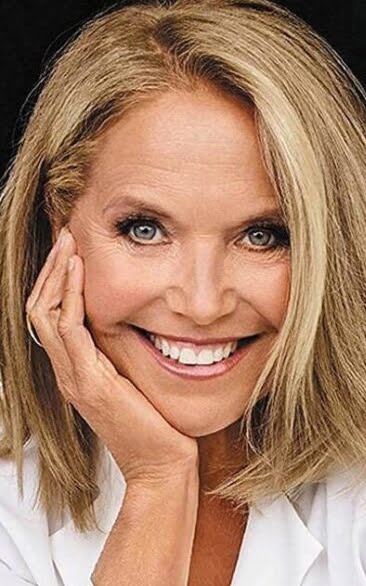

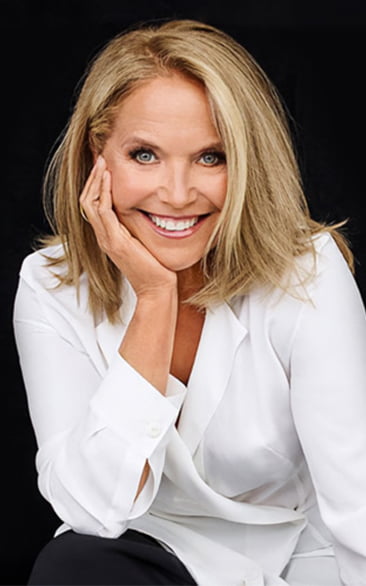
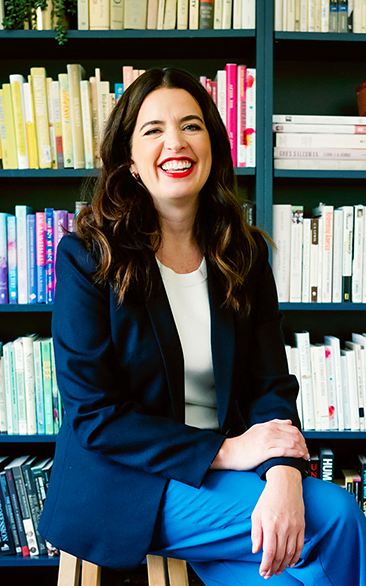


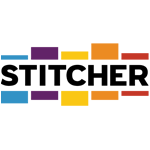





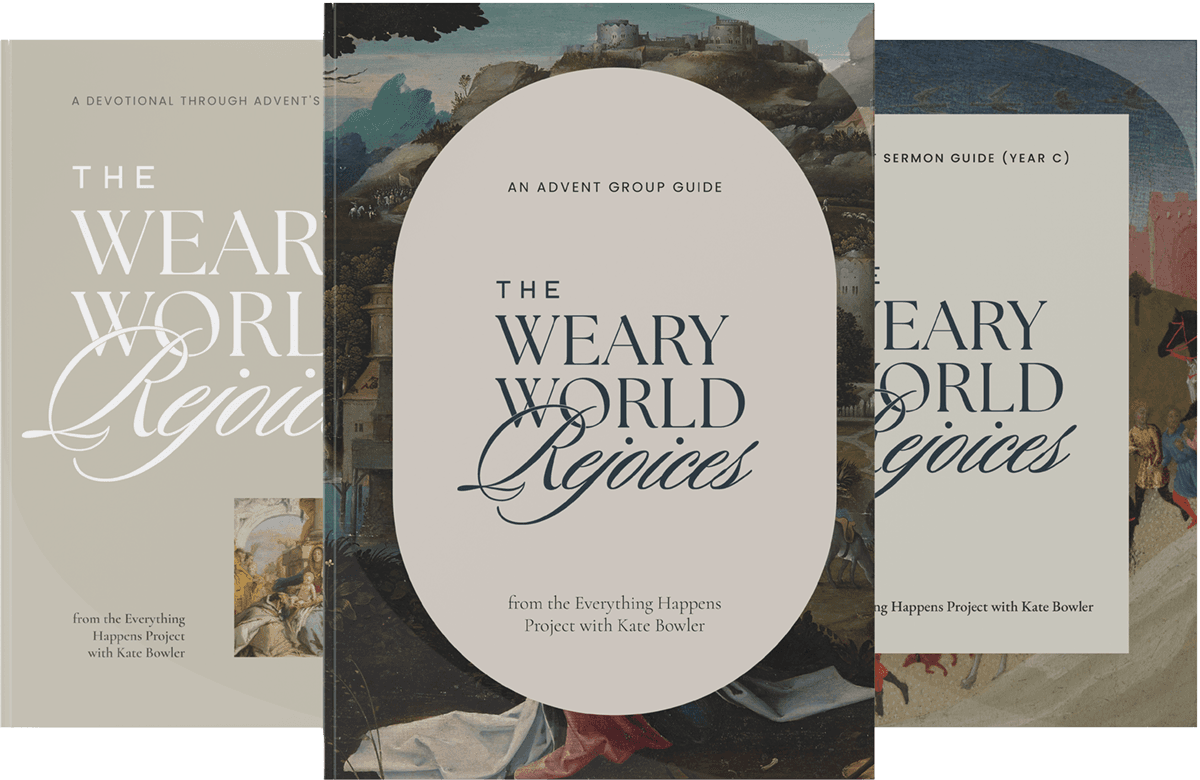
Leave a Reply